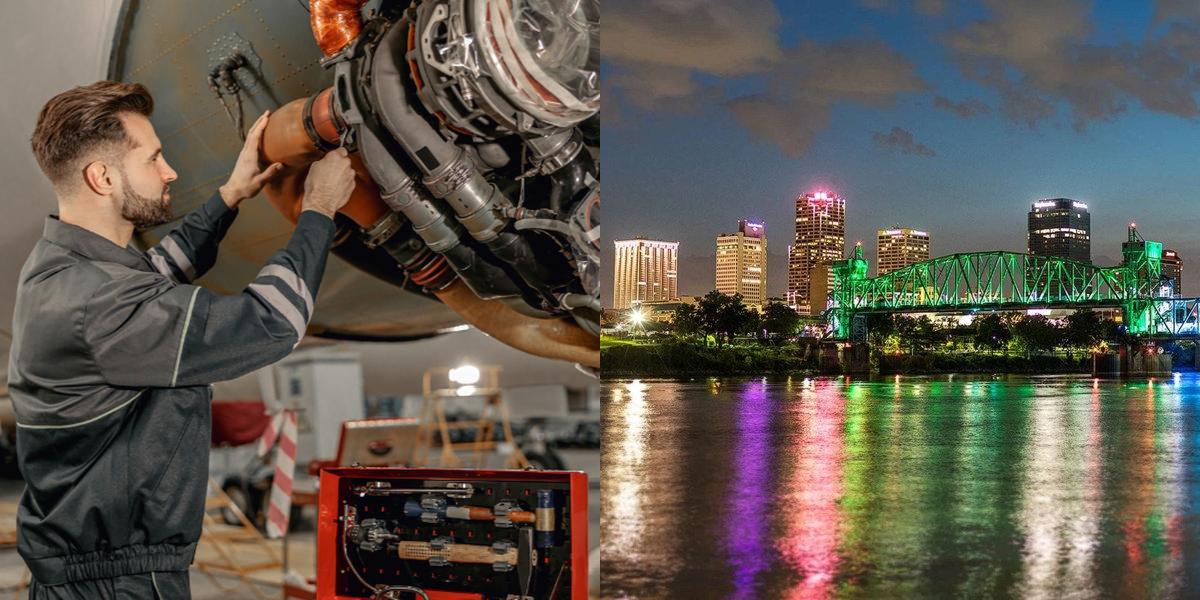How to Become an Aviation Mechanic in Arkansas

Want personalized recommendations?
Let's match you to the right program

Aviation mechanics play a crucial role in the aviation industry by ensuring that aircraft are safe and in optimal working condition. They are responsible for inspecting, repairing, and maintaining various components of aircraft, including engines, electrical systems, and landing gear.
Article continues after recommendations
Recommended for you
What Does an Aviation Mechanic Do?
Aviation mechanics perform a wide range of tasks to ensure the safety and functionality of aircraft. Some of their responsibilities include:
- Conducting regular inspections and maintenance on aircraft systems and components
- Identifying and troubleshooting mechanical and electrical issues
- Repairing or replacing faulty parts and systems
- Performing scheduled maintenance tasks, such as oil changes and system checks
- Keeping detailed records of maintenance and repairs
- Following strict safety protocols and regulations
Where Do Aviation Mechanics Work?
Aviation mechanics can work in various settings, including:
- Airports: Many aviation mechanics are employed by commercial airlines and work at airport maintenance facilities.
- Aircraft Manufacturing Companies: Some mechanics work for aircraft manufacturers, where they are involved in the assembly and testing of new aircraft.
- Repair Stations: Independent repair stations provide maintenance and repair services to aircraft owners and operators.
- Private Aviation: Aviation mechanics may also work for private individuals or companies that own and operate their own aircraft.
How to Become an Aviation Mechanic in Arkansas?
To become an Arkansas aviation mechanic, one must first complete an FAA-approved aviation maintenance technician program. Next, obtain the required certifications, including the Airframe and Powerplant (A&P) license. With these qualifications, individuals can then pursue job opportunities at airports, airlines, or aviation repair facilities, earning a competitive salary.
Requirements to Become an Aviation Mechanic in Arkansas
To become an aviation mechanic in Arkansas, you need to meet certain education and legal requirements. These include:
- Education: You must complete a Federal Aviation Administration (FAA)-approved aviation maintenance technician program. These programs are typically offered by vocational schools and community colleges and provide the necessary training and knowledge to become an aviation mechanic.
- Legal Requirements: You must be at least 18 years old, fluent in English, and hold a valid driver's license. Additionally, you must pass written, oral, and practical exams administered by the FAA.
Exploring a Career in Aviation Mechanic Outside Arkansas
For those inspired to become an Aviation Mechanic but living in a different state, achieving your ambition is still very much a possibility. You could explore becoming an Aviation Mechanic in Arizona, Massachusetts, New York, Oregon, or Wisconsin. And if you're not near any of these, Dreambound is here to assist by offering an easy way to find and compare Aviation Mechanic classes by search by zip code. With the right mindset and resources like Dreambound, starting a career in trade, construction, and industry is possible from any place.
Get courses selected just for you
Try our powerful search engine
Article continues after recommendations
More recommendations for you
How do I get my Aviation Mechanic certification?
If you are passionate about aviation and have a knack for fixing things, a career as an aviation mechanic may be the perfect fit for you. Aviation mechanics are responsible for ensuring the safety and proper functioning of aircraft, and their role is crucial in maintaining the integrity of the aviation industry.
To become a certified aviation mechanic, there are several steps you need to follow:
-
Meet the minimum requirements: To be eligible for aviation mechanic certification, you must be at least 18 years old and able to read, write, speak, and understand English. You also need to have a high school diploma or equivalent.
-
Choose a specialization: There are three main areas of specialization for aviation mechanics: airframe mechanics, powerplant mechanics, and avionics technicians. Airframe mechanics focus on the structural components of an aircraft, powerplant mechanics deal with engines, and avionics technicians handle the electronic systems of an aircraft. You can choose to specialize in one or more of these areas, depending on your interests and career goals.
-
Complete a training program: To acquire the necessary knowledge and skills, you will need to complete a training program approved by the Federal Aviation Administration (FAA). These programs can be found at aviation maintenance technician schools, community colleges, or technical schools. The duration of the program can vary, but it typically takes around 18 to 24 months to complete.
-
Gain practical experience: In addition to formal training, you will also need to gain practical experience working on aircraft. This experience can be acquired through an apprenticeship or on-the-job training program. Many aviation maintenance schools have partnerships with airlines or maintenance facilities, which can provide you with opportunities to gain hands-on experience.
-
Pass the FAA exams: Once you have completed your training and gained the necessary experience, you will need to pass a series of exams administered by the FAA. These exams consist of written, oral, and practical components, and they assess your knowledge and skills in your chosen specialization.
-
Apply for certification: After successfully passing the exams, you can apply for your aviation mechanic certification through the FAA. The application process involves submitting the necessary paperwork, including your exam results and proof of experience, as well as paying the required fees.
-
Maintain your certification: Once you have obtained your aviation mechanic certification, you will need to fulfill certain requirements to maintain it. These requirements include completing ongoing training and education, as well as undergoing regular inspections and audits to ensure compliance with safety standards.
How do I get a job as an Aviation Mechanic?
After obtaining your aviation mechanic certification, the next step is to find a job in the field. Here are some steps you can take to increase your chances of getting hired as an aviation mechanic:
-
Build a strong resume: Begin by creating a professional resume that highlights your education, training, and experience as an aviation mechanic. Include any relevant certifications, internships, or apprenticeships you have completed. If possible, tailor your resume to the specific job you are applying for, emphasizing the skills and qualifications that align with the requirements of the position.
-
Network: Networking is an essential part of any job search. Attend industry events, join professional organizations, and connect with others in the aviation industry. Building relationships with professionals in the field can help you gain valuable insights, get referrals, and access hidden job opportunities.
-
Apply for jobs: Start applying for aviation mechanic positions through various channels, such as online job boards, company websites, and recruitment agencies. Be proactive and follow up on your applications to demonstrate your interest and enthusiasm for the role.
-
Prepare for interviews: Before attending an interview, research the company and familiarize yourself with its operations, values, and culture. Prepare answers to common interview questions and practice your responses. Be ready to showcase your technical skills, problem-solving abilities, and commitment to safety.
-
Continuously improve your skills: The aviation industry is constantly evolving, and staying up to date with the latest technologies and regulations is crucial. Take advantage of professional development opportunities, such as workshops, seminars, and online courses, to enhance your knowledge and skills. This will not only make you a more attractive candidate but also increase your chances of career advancement.
-
Consider apprenticeships or internships: If you are having difficulty finding a job as an aviation mechanic, consider applying for apprenticeships or internships. These opportunities provide valuable hands-on experience and can lead to full-time employment in the future. Additionally, some companies offer on-the-job training programs that can help you gain the experience you need to advance your career.
-
Be persistent: Finding a job as an aviation mechanic may take time and effort, so it's important to stay persistent and not get discouraged. Keep applying for positions, attending networking events, and improving your skills. Remember that each rejection brings you one step closer to the right opportunity.
Career Paths and Opportunities after Becoming an Aviation Mechanic
Becoming an aviation mechanic opens up a wide range of career paths and opportunities within the aviation industry. Here are some potential career paths you can pursue after obtaining your certification:
-
Aircraft maintenance technician: As an aircraft maintenance technician, you will be responsible for inspecting, maintaining, and repairing aircraft to ensure their safe operation. This role can be further specialized in airframe, powerplant, or avionics maintenance, depending on your interests and expertise.
-
Quality assurance inspector: Quality assurance inspectors play a crucial role in ensuring that aircraft maintenance and repair work meets regulatory standards and quality requirements. They conduct inspections, audits, and tests to identify any potential issues or non-compliance and recommend corrective actions.
-
Aircraft manufacturing: With your knowledge and experience as an aviation mechanic, you could work in the aircraft manufacturing industry. This could involve assembling, testing, and troubleshooting aircraft components or systems during the production process.
-
Aircraft modification and retrofitting: Many airlines and aircraft operators modify and retrofit their aircraft to enhance performance, increase efficiency, or comply with regulatory changes. As an aviation mechanic, you could specialize in aircraft modification and retrofitting, working on projects such as installing new avionics systems or upgrading engines.
-
Aviation management: If you have strong leadership and organizational skills, you could pursue a career in aviation management. This could involve overseeing the maintenance operations of an airline or managing a maintenance facility. Aviation management roles often require a combination of technical expertise and business acumen.
-
Aircraft sales and brokerage: Another potential career path is working in aircraft sales and brokerage. As an aviation mechanic, you will have a deep understanding of aircraft systems and components, which can be valuable when advising clients on their aircraft purchase or sale.
-
Teaching and training: If you enjoy sharing your knowledge and expertise, you could consider a career in teaching or training. You could become an instructor at an aviation maintenance technician school or provide on-the-job training for new aviation mechanics.
These are just a few examples of the diverse career paths available to aviation mechanics. The aviation industry offers numerous opportunities for growth, career advancement, and specialization, making it an exciting and fulfilling field to work in.
Final Thoughts
Becoming an aviation mechanic requires dedication, hard work, and continuous learning. By following the steps outlined in this article, you can obtain your aviation mechanic certification and open the door to a rewarding career in the aviation industry.
Remember to stay current with industry trends and regulations, network with professionals in the field, and continuously improve your skills to maximize your career opportunities. Whether you choose to specialize in airframe maintenance, powerplant maintenance, or avionics, the aviation industry offers a wide range of career paths and opportunities for growth.
If you are passionate about aviation and have a knack for problem-solving, becoming an aviation mechanic in Arkansas could be the perfect career choice for you. With its rich aviation history and growing aerospace industry, Arkansas offers a range of job opportunities for aspiring aviation mechanics. So take the first step towards your dream career and start your journey to becoming an aviation mechanic today!
Wondering if there's more? Perhaps these other articles will be more helpful if this one isn't exactly what you're after:

Harold Roldan is a Growth team member at Dreambound. With a background in IT, he works with data and automation to improve team efficiency and workflows. He spends his free time playing musical instruments or studying data, computers, and technology.



